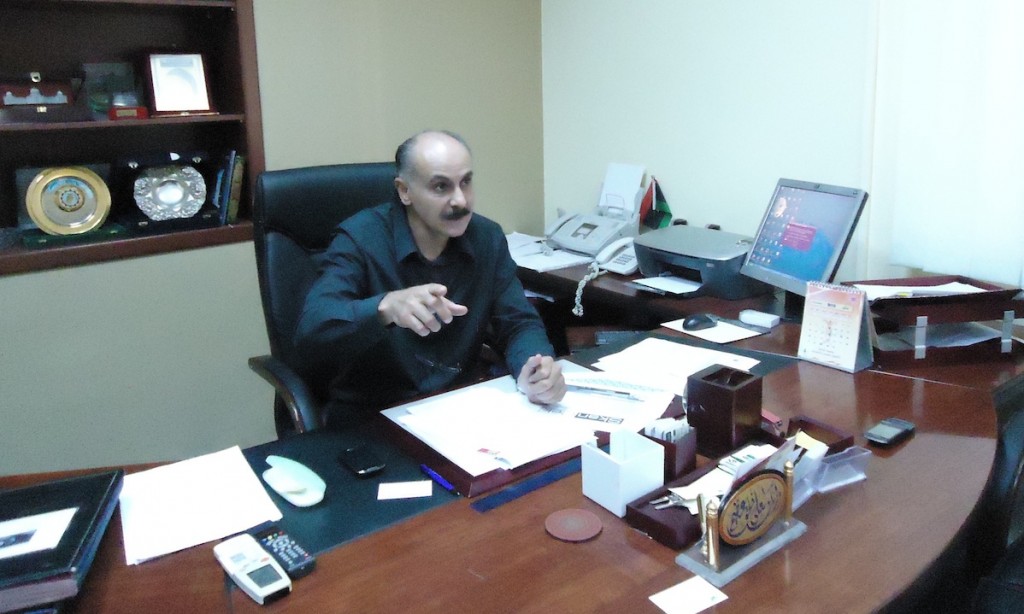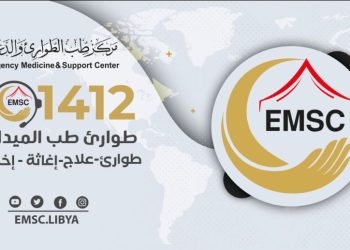By Ashraf Abdul Wahab.
Ahmed Mohammed Al-Faqi, director . . .[restrict]general of Tripoli’s Chamber of Commerce, Industry and Agriculture, talks about post-Revolution opportunities and frustrations
The Tripoli Chamber of Commerce, established in 1932 in the days of the Italian occupation, is one of the oldest chambers in the Arab world.
“We used to face a problem” said Al-Faqi, “with what was called ‘the People’s Committee of the Economy,’ a state institution which used to dominate the Chamber of Commerce. Under this system, the economy minister was authorised to choose the president of the Chamber’s board of directors. Two-thirds of the 12 committee were selected by the General Assembly, while the remainder were chosen by what was called the People’s Committee of the Economy”.
Al-Faqi explained: “We requested, at the time, for the Chamber of Commerce to be independent, which would have meant that the General Assembly was the decision-maker, able to choose its chairman, instead of this being imposed by the state.”
He added that the set-up meant that the capabilities of the Libyan Chamber of Commerce were limited.
“Chambers of Commerce around the world play a very important and significant role, but unfortunately we in Libya did not, to date, have the opportunity and were not given the chance or the permission to carry out our duties.”
Al-Faqi said he believed strongly that the Chamber of Commerce should be involved in all activities of business delegations coming to Libya, but admitted and complained that this had not always been the case before the Revolution.
Asked about whether Chamber had played a role in the reported 600 percent increase in trade between Libya and Egypt, Al-Faqi said: “We are now involved in all trade delegations visiting Libya and with the ones visiting Egypt.”
Nor was it under any pressure to contribute to raising the country’s volume of imports and exports, saying: “We certainly have no power to increase imports and exports nor chose countries to do business with.”
“The Chamber of Commerce plays no role in the promotion of any company. Our role is simply to provide services for our affiliated members, such as announcing the participation of companies in a specific exhibition or alongside a visiting delegation”, Al-Faqi said.
A major problem for the Chamber since before the Revolution is inaccurate contact details for businesses. “Many members of the Chamber did not supply us with accurate information — out of fear, I suppose.”
He noted the impossibility of communicating with members who had supplied telephone numbers that “turned out to be for a public notary office, which helped the member finalise his company’s registration, or a private home where the member used to live as tenant”.
He added: “In many cases the contact information supplied by members turned out to be false and that particular company would be non-existent, only existing as some paperwork on a file”, Al-Faqi said.
Strict new registration rules are being implemented now, where “every new member wanting to register with the Chamber must fill in detailed forms and the information supplied must be 100-percent accurate”.
Al-Fariq admitted that the Chamber has long suffered from inadequate communication with its members, which number between 30,000 and 35,000. This is a problem it is now addressing by improving online services and communications.
“We have now started using a new and more efficient system. In the past we contacted members by phone or fax and, because of the large numbers of members, we were unable to contact them all. We now use a modern digital approach. We have launched a website and initiated a webpage on the social network, Facebook, in order to facilitate better communication with our members and provide them with more up-to-date information on the Chamber.”
Despite these efforts, however, he noted that the number of members who keep in regular touch with the Chamber remained low.
“We do not know the real reasons behind members’ lack of communication with the Chamber, despite the fact that we offer to hold seminars and meetings with members”, Al-Faqi said.
He added that members were failing to take advantage of the information now readily available on the Chamber’s website, which he said is regularly updated and provides all necessary information. The website is currently being modernised and developed, along with other services.
“We made an agreement with a specialised company to prepare a printed manual of the Chamber of Commerce, as well as to make us a protected CD which would be distributed among members and which contains all companies’ data. Through this, anyone can reach any of the companies they wish to do business with.”
However, even this project is challenged by members’ long-standing habit of supplying inaccurate contact details.
Some of the Chamber’s goals, such as developing the department’s digital capability and online services, are currently on hold. Al-Faqi said: “We are now awaiting the appointment of a (new) Economy Minister in order to give the chamber its due jurisdictions in order to achieve its goals.” This was because enabling regulations for the Chamber could only occur following the appointment of a new economy minister.
Other changes are, however, already underway. One initiative, started four months ago, is the ‘Documentation and Arbitration Centre,’ where decisions are made by a judicial committee.
Among the Centre’s tasks, Al-Faqi explained “is providing protection between parties to an agreement and any other company, whether here in Libya or abroad”.
The committee is active and cases are already being brought to the Chamber. “This is a good step for the citizen’s protection and also protection for local and foreign companies alike”, said Al-Faqi.
The Chamber has a role that not all chambers of commerce around the world enjoy. All registered companies in the capital have to join. It is compulsory. Companies in other part of Libya must likewise join their local chambers. It is not just private companies that have to join; public ones must do so as well.
“Our role becomes apparent after the company has been founded. New companies, be they local, international or a joint-venture, have to meet set rules and conditions. This means after a company provides the necessary documentation and approval from the Ministry of Economy, and after the company’s inclusion in the commercial register, the last stage will be joining the Chamber of Commerce.”
A long-standing issue for the Chamber has been a lack of appropriate commercial personnel in Libyan embassies abroad.
“It has became customary for commercial office employees at our overseas missions to be chosen from the Ministry of Foreign Affairs or from the protocol department. The personnel thus have no commercial knowledge or experience”, Al Faqi explained.
“We have made a proposal to provide all commercial offices abroad with commercially qualified persons,” either from the Ministry of Economy or Chamber of Commerce. “We do hope that the Ministry of Economy will give us full power, so that the Chambers of Commerce are able to perform their assigned duties”, he added.
The services the Chamber now offers include visa assistance for foreign businessmen, Al-Faqi said.
“We have coordinated with the General Passports Department and informed them that we have a number of businessmen and companies that want to apply for visas [for foreign businessman], and they gave us authority for that.”
Any Chamber member wishing to apply for a Libyan visa on behalf of someone from a company he or she has dealings with, now only needs to write a formal letter to that effect, including the name of the company and the details of the persons needing visas.
Al-Faqi said that the Tripoli Chamber of Commerce tried to provide as much help and support as possible to both private and public companies. He warned, however, that the responsibility for registration, which in Libya is compulsory for all businesses, lay with each individual company. He added that accurate and up-to-date contact information and payment of due fees was required, in order for companies to benefit from the advantages offered by membership. [/restrict]







